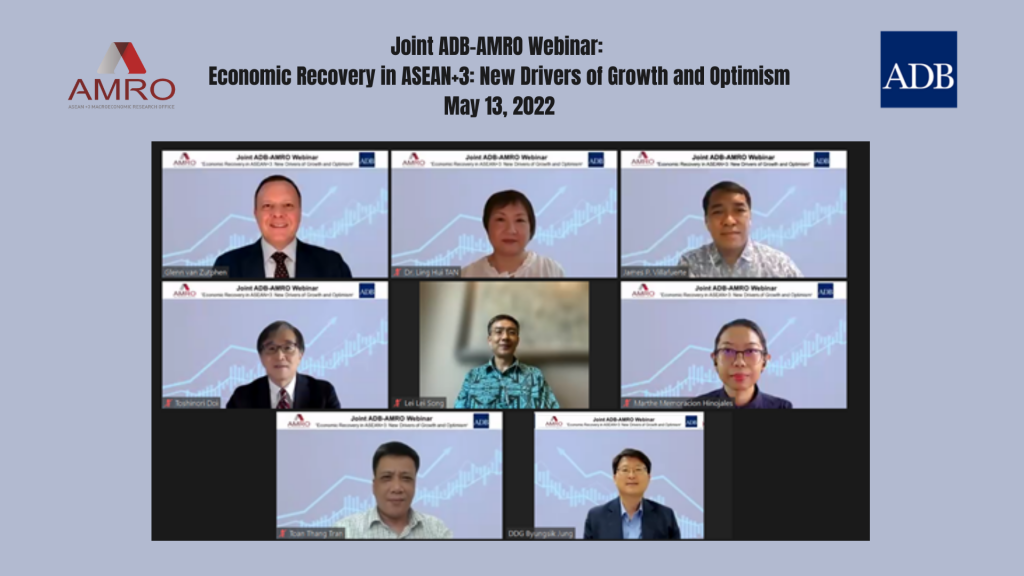
Top Row (from L to R): Glenn van Zutphen, Moderator; Ling Hui Tan, Group Head and Lead Economist, Regional Surveillance, AMRO; James Villafuerte, Senior Economist, Southeast Asia Department, ADB
Toshinori Doi, Director, AMRO; Lei Lei Song, Director, Economic Research and Regional Cooperation Department, ADB; Marthe M. Hinojales, Economist, Regional Surveillance, AMRO
Toan Thang Tran, Director, Department of Industrial Forecast and Enterprise Development, National Center for Socio-economic Information and Forecast, Vietnam; Byungsik Jung, Deputy Director-General, International Finance Bureau, Ministry of Economy and Finance, Korea
SINGAPORE, May 13, 2022 – The ASEAN+3 Macroeconomic Research Office (AMRO) and Asian Development Bank (ADB) today held a webinar on Economic Recovery in ASEAN+3: New Drivers of Growth and Optimism. The webinar highlighted two new publications – ADB’s Post-COVID-19 Economic Recovery in Southeast Asia and AMRO’s ASEAN+3 Regional Economic Outlook 2022: ASEAN+3 Growth Strategy in the Pandemic’s Wake.
“This webinar was a side event of the 25th ASEAN+3 Finance Ministers’ and Central Bank Governors’ Meeting. The Meeting discussed pandemic policy support, new growth opportunities and regional cooperation. As the region’s policy advisors, ADB and AMRO organized this forward-looking webinar to continue the ASEAN+3 Ministers and Governors’ conversation on new drivers of growth in the wake of the pandemic,” said Toshinori Doi, AMRO Director.
More than two years into the COVID-19 pandemic, economic recovery is beginning to gain momentum in the ASEAN+3 region. The webinar focused on several themes critical to economic recovery in the region, including scarring effects of the pandemic and new sectoral growth drivers at the regional and country levels.
“COVID-19 has been both a major disruptor and a catalyst for change. After two years and counting, some extent of scarring is unavoidable—although it will take different forms in different economies and some economies will be more affected than others. On the other hand, the pandemic has spurred innovation in sectors such as retail, finance, and healthcare, which might lift the region’s economies in the long run toward higher productivity-driven growth,” said Ling Hui Tan, AMRO Group Head and Lead Economist for Regional Surveillance.
The discussion touched on well-established sectors, including tourism, garment and agro-processing, and their trajectory in a post-pandemic world, along with industries that have emerged with high potential for future growth, such as electronics, and digital trade and services. It also covered discussion on policy response to a number of risks, including rising inflation and supply disruptions from the war in Ukraine, which continues to evolve.
“Supporting industries with competitive advantage to propel a green, resilient, and inclusive recovery will not only require sector-specific interventions by governments, but crosscutting measures that encourage an enabling business environment, improved infrastructure, and stronger intra-regional linkages,” said ADB Director General for Southeast Asia, Ramesh Subramaniam.
The webinar also discussed policies to help strengthen the business environment, improve infrastructure, and crowd-in private sector participation to support these growth drivers, and the role of regional cooperation in building a better, greener, and more resilient ASEAN+3 region in a post-pandemic scenario.
The inaugural ADB-AMRO joint webinar saw a strong line up of speakers, including Byungsik Jung, Deputy Director-General, International Finance Bureau, Ministry of Economy and Finance, Korea; Toan Thang Tran, Director, Department of Industrial Forecast and Enterprise Development, National Center for Socio-economic Information and Forecast, Vietnam; Lei Lei Song, Director, Economic Research and Regional Cooperation Department, ADB; James Villafuerte, Senior Economist, Southeast Asia Department, ADB; Toshinori Doi, Director, AMRO; Ling Hui Tan, Group Head and Lead Economist, Regional Surveillance, AMRO; and Marthe M. Hinojales, Economist, Regional Surveillance, AMRO.
About AMRO
The ASEAN+3 Macroeconomic Research Office (AMRO) is an international organization established to contribute toward securing macroeconomic and financial stability of the ASEAN+3 region, comprising 10 members of the Association of Southeast Asian Nations (ASEAN) and China; Hong Kong, China; Japan; and Korea. AMRO’s mandate is to conduct macroeconomic surveillance, support the implementation of the regional financial arrangement, the Chiang Mai Initiative Multilateralisation (CMIM), and provide technical assistance to the members.
